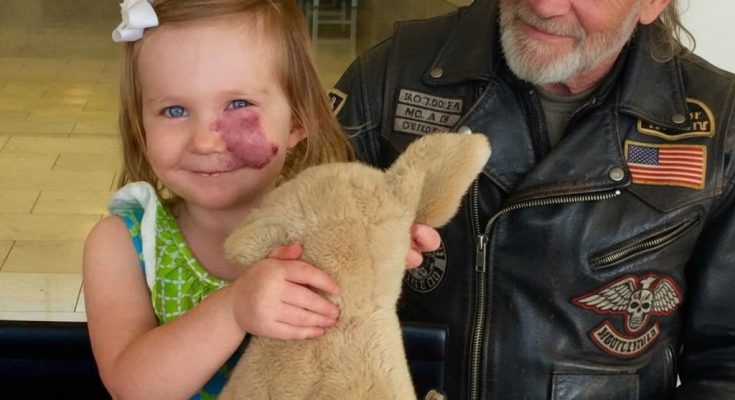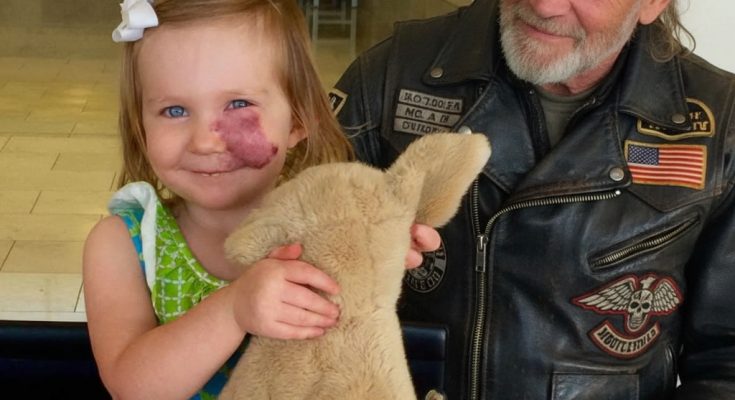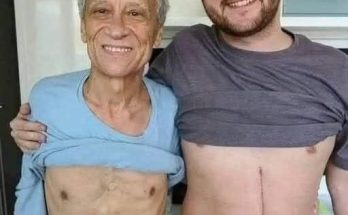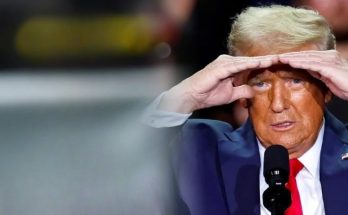Biker asked to adopt the little girl with facial tumor whom nobody else wanted. I watched through the observation window as this massive man in a leather vest covered in patches knelt in front of little Ruth and asked if she’d like to come home with him.
Ruth, age four, with a birthmark covering half her face that looked like a purple tumor. Ruth, who’d been in foster care for three years. Ruth, who’d been returned to the agency six times by families who said they “couldn’t handle the stares.”
My name is Patricia Wells and I’ve been a social worker for twenty-three years. I’ve seen a lot of heartbreak. A lot of kids nobody wants. But Ruth broke my heart more than any child I’d ever worked with.
She was beautiful. Bright blue eyes. Sweet smile. Gentle soul. But that birthmark—a port-wine stain that covered her left cheek and part of her nose—made people reject her over and over again.
The first family returned her after two weeks. Said the other children at church were scared of her. The second family lasted a month. Said they couldn’t afford the medical bills for potential treatments. The third family returned her after three days. Didn’t even give a reason.
By the time she was four, Ruth had been rejected so many times she stopped talking. Just stopped. The doctors said there was nothing physically wrong with her vocal cords. She simply decided words weren’t worth it anymore.
And then Robert Morrison walked into my office.
He was sixty-six years old. Single. Retired Marine. Rode with a motorcycle club called the Guardians. Had a gray beard down to his chest and arms covered in tattoos. He looked like every suburban parent’s nightmare.
Get all the stories straight to your inboxSubscribe
We use your personal data for interest-based advertising, as outlined in our Privacy Notice.
“I want to foster a child,” he said. “Preferably one that other people have given up on.”
I remember studying him carefully. “Mr. Morrison, fostering isn’t easy. Especially with hard-to-place children. These kids come with trauma. With special needs. With behaviors that can be extremely challenging.”
“Ma’am, I spent twenty-six years in the Marines. I’ve been to war three times. I’ve seen things that would break most people.” He leaned forward. “I think I can handle a traumatized kid.”
“Why do you want to foster?” I asked. “Most single men your age are enjoying retirement. Traveling. Relaxing. Why take on this kind of responsibility?”
His eyes filled with tears. “Because my daughter died when she was seven. Brain tumor. That was thirty years ago. And I’ve spent every day since then wishing I could save just one more little girl.”
I pulled Ruth’s file. Showed him her picture. Explained her situation. The birthmark. The rejections. The fact that she’d stopped speaking.
Robert stared at that photo for a long time. Then he said something that made my blood run cold. “I know this little girl.”
“What?” I looked at him confused. “Mr. Morrison, that’s impossible. Ruth’s case is confidential. Her photo isn’t public.”
“I don’t mean I’ve met her.” His hands were shaking. “I mean I know her. Three months ago, I was at the children’s hospital visiting kids with my club. We do it every month. Bring toys. Spend time with sick kids.”
He paused, tears running into his beard. “I saw a little girl in the waiting room. She had this birthmark. She was sitting alone while all the other kids played. I walked over and sat next to her. Didn’t say anything. Just sat.”
“After a few minutes, she looked at me and touched my vest. Touched the patches. Then she whispered one word: ‘Pretty.’ First word she’d said in weeks according to the nurse.”
Robert’s voice cracked. “I gave her a small teddy bear from my bag. One with a vest like mine. She hugged it and smiled. And when I had to leave, she grabbed my hand. Held on tight. The foster mother had to pry her fingers off me.”
He looked at me with devastation in his eyes. “I asked the foster mother if I could visit again. She said no. Said she didn’t want ‘people like me’ around her foster daughter. Said bikers were a bad influence.”
“That was the fourth family,” I said quietly. “They returned Ruth two weeks later.”
Robert was crying now. “I’ve thought about that little girl every single day for three months. Wondered if she was okay. Wondered if anyone was holding her. And now you’re telling me she’s been rejected two more times since then?”
“Mr. Morrison—”
“I want her.” He stood up. “I don’t care about the process. I don’t care how long it takes. I want to foster Ruth. And I want to adopt her. That little girl grabbed my hand and didn’t want to let go. Well, I’m not letting go either.”
[MAXIMUM CURIOSITY POINT – 350 WORDS – END FACEBOOK INTRO HERE]
What I didn’t tell him right then—what I couldn’t tell him until the background check was complete—was that Ruth had done something after that encounter that shocked everyone. She’d started drawing pictures. Dozens of them. All of the same thing: a big man with a beard holding hands with a little girl.
The child psychologist said Ruth had formed an attachment in those brief minutes. That Robert had been the first man who’d sat with her without flinching. Without staring at her birthmark. Without pity in his eyes.
“She asks about him,” the psychologist had told me in our last meeting. “She calls him ‘the bear man.’ She wants to know when he’s coming back.”
And now he was back. Not just to visit. But to take her home.
I scheduled the first meeting for the following week. Warned him that Ruth probably wouldn’t remember him. That three months was a long time for a traumatized four-year-old. That he shouldn’t expect recognition.
But when Ruth walked into the meeting room and saw Robert sitting there, she stopped dead. Stared at him. Then she ran.
Not away from him. Toward him.
She crashed into his legs and wrapped her arms around his knees. And she said her second word in seven months: “Bear.”
Robert dropped to his knees and hugged her. This massive man and this tiny girl holding each other like they’d been separated for years instead of months. Both of them crying.
“I came back,” Robert whispered. “I came back for you, sweetheart. And this time, I’m not leaving.”
Ruth pulled back and looked at him with those huge blue eyes. “Promise?”
“I promise. If you’ll have me, I want to be your dad. I want to take you home forever.”
Ruth touched his face. Touched his beard. Touched the patches on his vest. Then she said the longest sentence anyone had heard from her in months: “I drawed you. Every day. I drawed you and me holding hands.”
Robert’s face crumpled. “Can I see your drawings, sweetheart?”
Ruth nodded. Ran to her backpack and pulled out a folder. Inside were dozens of pictures. Some in crayon. Some in marker. All showing the same scene: a big figure and a small figure holding hands.
Robert looked through every single one. Tears streaming down his face. “These are beautiful, Ruth. Can I keep them?”
Ruth nodded. “You can keep them in our house. When you take me home.”
“You want to come home with me?”
Ruth climbed into his lap. Put her head on his chest. And whispered: “I been waiting.”
That destroyed everyone in the room. The psychologist was crying. I was crying. Even the supervisor who’d been skeptical about placing Ruth with a single male biker was wiping her eyes.
We started the placement process immediately. Home study. Background checks. References. Robert passed everything with flying colors.
But there was one problem. A big problem. One that almost destroyed everything.
Ruth’s biological mother showed up.
The woman who’d abandoned Ruth at eighteen months because she “couldn’t look at her.” The woman who’d signed away her rights three years ago. She was suddenly back. And she was demanding custody.
“I made a mistake,” she told the judge. “I was young and scared. But I’m ready to be a mother now. I want my daughter back.”
The judge ordered a psychological evaluation. Ordered family reunification counseling. Ordered supervised visits. The system was designed to reunify families when possible. Even when those families had caused the trauma in the first place.
Ruth had nightmares after the first visit with her biological mother. She cried for hours. Refused to eat. Started pulling her hair out.
“She told me I’m ugly,” Ruth whispered to Robert. “She said that’s why she left. Because I’m ugly.”
Robert held her while she sobbed. “Ruth, listen to me. You are not ugly. Your mother is sick. She has problems that have nothing to do with you. But you, sweetheart, you are perfect.”
“But she’s my mommy. Mommies are supposed to love you.”
“Real mothers do love their babies. Always. No matter what. But some people aren’t ready to be mothers. Some people can’t see past their own problems to love someone else. That’s not your fault. That’s hers.”
The reunification process dragged on for six months. Six months of Ruth being forced to visit a woman who’d abandoned her. A woman who told Ruth repeatedly that her birthmark was “unfortunate” and asked if they could “fix it” before Ruth came home.
Robert was powerless. He’d been approved as a foster parent but he had no legal standing to fight the reunification. All he could do was hold Ruth when she came back broken from each visit. Tell her she was loved. Tell her she was wanted.
And pray the judge would see what everyone else saw: that this woman didn’t want her daughter. She wanted the welfare money. The attention. The ability to tell people she’d “overcome her fears” and taken her daughter back.
The final hearing was scheduled for December 15th. Robert brought his entire motorcycle club. Sixty bikers in leather vests sitting in a courtroom, silently supporting this little girl they’d all come to love.
Ruth’s biological mother showed up in designer clothes. Talked about her new apartment. Her stable job. Her readiness to be a mother.
Then the judge asked Ruth what she wanted.
Ruth was five years old by then. Old enough to have a voice. She stood up in that courtroom, wearing a white dress and holding Robert’s hand.
“I want to stay with my bear,” she said clearly. “He loves me. He doesn’t care about my face. He says I’m beautiful. He’s my real daddy.”
The biological mother started crying. “But Ruth, I’m your mother. I gave birth to you. You belong with me.”
Ruth looked at her with those wise, ancient eyes. “You left me because of my face. Bear chose me because of my face. He said it makes me special. You don’t love me. He does.”
The judge was quiet for a long moment. Then he spoke. “Mrs. Wells, you willingly terminated your parental rights three years ago. You’ve had minimal contact with your daughter since. Your motivation for reunification appears to be financial rather than emotional.”
“Mr. Morrison, you’ve provided a stable, loving home for Ruth. You’ve addressed her medical needs. You’ve helped her heal from significant trauma. Ruth clearly feels safe and loved in your care.”
He looked at Ruth. “Ruth, I know this is hard. But I need to make a decision about where you’ll live.”
Ruth squeezed Robert’s hand tighter. “I want to live with Bear. Forever. Please don’t make me go with her. Please.”
The judge nodded slowly. “Then that’s my ruling. Parental rights will remain terminated. Mr. Morrison, you’re awarded full custody with the path to adoption opened immediately.”
Robert dropped to his knees and hugged Ruth. The entire motorcycle club erupted in cheers. Ruth’s biological mother stormed out, screaming about appeals.
But none of that mattered. Because Ruth was finally safe. Finally home. Finally with someone who loved every single part of her.
The adoption was finalized six months later. Ruth wore a white dress and a leather vest that Robert had custom made for her. It said “Ruth ‘Warrior’ Morrison” on the back.
She’s ten years old now. Confident. Happy. Thriving. The birthmark has faded with treatments but it’s still visible. And Ruth loves it.
“It’s how Bear found me,” she says. “It’s my special mark. It means I’m exactly who I’m supposed to be.”
She wants to be a doctor when she grows up. Specifically a dermatologist who works with kids with facial differences. “So I can tell them they’re beautiful like Bear told me.”
Robert is sixty-nine now. Still riding. Still active in his club. Still the most devoted father I’ve ever seen.
And Ruth adores him. Brags about her “biker dad” to anyone who will listen.
Last month she wrote an essay for school: “My dad is a biker. People think bikers are scary. But my dad is the gentlest person I know. He chose me when my real mom didn’t want me. He taught me I’m beautiful. He’s my hero.”
Robert cried when he read it. So did I.
The biker asked to adopt the girl with the facial tumor that nobody else wanted. And in doing so, he saved two lives. Ruth’s. And his own.
Because sometimes the most unlikely people make the most beautiful families. Sometimes the person everyone fears is exactly who a broken child needs. Sometimes love shows up in leather and rides a Harley.
And sometimes a little girl’s drawing of a bear holding her hand becomes a prophecy that changes everything.




